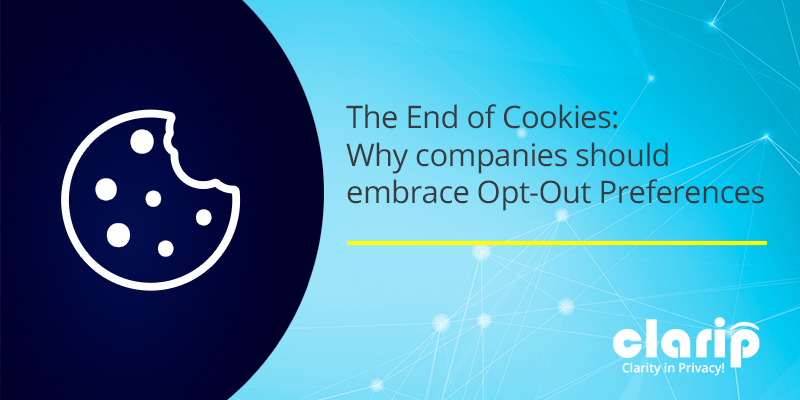The End of Cookies: Why companies should embrace Opt-Out Preferences

The era of third-party cookies is coming to an end. In June 2021, Google announced it would phase out third-party cookies in late 2023 — which has since been pushed back to 2024 yet deprecated as early as July 2023 – and marketers are scrambling in anticipation of potential fallout. Privacy concerns and evolving regulations, state and abroad, have prompted a shift towards user-centric data protection. Companies must prioritize consumer data privacy and empower individuals with opt-out preferences. This article explores the implications of the end of cookies, highlighting why companies should embrace opt-out preferences as a way to build confidence, foster transparency, and enhance their relationships with users.
What are some reasons that third-party cookies are going away?
Serious privacy concerns – Third-party cookies are used by advertisers and marketers to track users’ browsing behavior across multiple websites. This tracking raises privacy concerns as users may not be aware of the data being collected about them or have control over how it is used. There have been growing concerns about data breaches, online tracking, and the misuse of personal information, leading to increased calls for enhanced privacy measures.
User control and consent – Many users express that their online activities should be more private and that they should have control over the data collected about them. In response to these concerns, regulatory bodies and technology companies are taking steps to give users more control and choice over their data. This includes requiring explicit user consent for tracking activities and giving users the ability to opt out of data collection.
Cross-site tracking and fingerprinting – Third-party cookies have been commonly used for cross-site tracking, which involves tracking users across different websites to gather comprehensive profiles about their online behavior. However, this method has become less effective due to user actions like clearing cookies or using privacy-focused browser settings. As a result, alternative tracking methods like browser fingerprinting have emerged. These methods collect unique browser and device characteristics to identify and track users, bypassing the limitations imposed on third-party cookies. Even fingerprinting is being scrutinized, and browsers are taking steps to mitigate its effectiveness as well.
Succeeding in a Post-Cookie World
Upholding User and Consumer Privacy – With the phasing out of third-party cookies, companies have an opportunity to prioritize user privacy. By implementing opt-out preferences, businesses demonstrate their commitment to protecting personal information. Respecting user choices and allowing them to control their data builds trust and fosters a positive brand image.
Regulatory Compliance – Privacy regulations, such as the General Data Protection Regulation (GDPR) and the California Consumer Privacy Act (CCPA), have emphasized the importance of user consent and control over data. Implementing opt-out preferences aligns companies with these regulations and helps them avoid potential penalties and reputational damage. Global Privacy Controls (GPC) make compliance even easier and more reliable for consumers to enact their privacy rights and for companies to comply.
Enhanced Transparency – Providing opt-out preferences encourages transparent practices and promotes open communication with users. Companies can clearly outline the types of data collected, how it is used, and provide users with the ability to opt out of specific data collection or sharing practices. This transparency instills confidence in users, knowing that their choices are respected, and their data is handled responsibly.
Personalized Experience – Contrary to popular belief, opting out of data collection doesn’t mean sacrificing personalization. Companies can employ innovative techniques, such as contextual advertising and consent-based tracking, to deliver relevant content and personalized experiences. By obtaining explicit consent, businesses can build direct relationships with users and ensure that personalization is based on their preferences.
Strengthened Customer Relationships – By adopting opt-out preferences, companies signal their commitment to customer-centric practices. This approach strengthens the relationship between businesses and users, fostering a sense of loyalty and satisfaction. Users are more likely to engage with companies that prioritize their privacy and empower them to make informed decisions about their data.
Competitive Advantage – In a landscape where privacy and data protection are increasingly valued by consumers, adopting opt-out preferences can provide a competitive advantage. By offering greater control and transparency, companies differentiate themselves from those that continue to rely on outdated data collection practices. Privacy-conscious customers are more likely to choose companies that respect their preferences and protect their personal information. Those that opt-in are more likely to continue a long-lasting relationship and are looking for improved shopping experiences.
“My Privacy Choices” is a superior solution
The end of cookies marks a turning point for the digital ecosystem, placing user privacy at the forefront. Companies that embrace opt-out preferences demonstrate their commitment to privacy, transparency, and user empowerment. By allowing individuals to control their data and respecting their choices, businesses can foster trust, strengthen customer relationships, and gain a competitive edge in a privacy-conscious world. Embracing this new era of user-centric data practices is not only a necessity but also an opportunity for companies to build a more sustainable and privacy-respecting future.
Click here to learn more about our Preference and Consent Management Platform! Clarip takes enterprise privacy governance to the next level and helps organizations reduce risks, engage better, and gain customers’ trust!
Contact us at www.clarip.com or call Clarip at 1-888-252-5653 for a demo.
Email Now:
Mike Mango, VP of Sales
mmango@clarip.com
Related Content:
Making the Case for Data Minimization
Automated Data Mapping
Data Discovery
Looking for Product Data Sheets?

 Data Risk Intelligence
Data Risk Intelligence Automated Data Mapping
Automated Data Mapping Do Not Sell/Do Not Share
Do Not Sell/Do Not Share Cookie Banner Solutions
Cookie Banner Solutions Consent & Preferences
Consent & Preferences Data Rights Requests
Data Rights Requests
